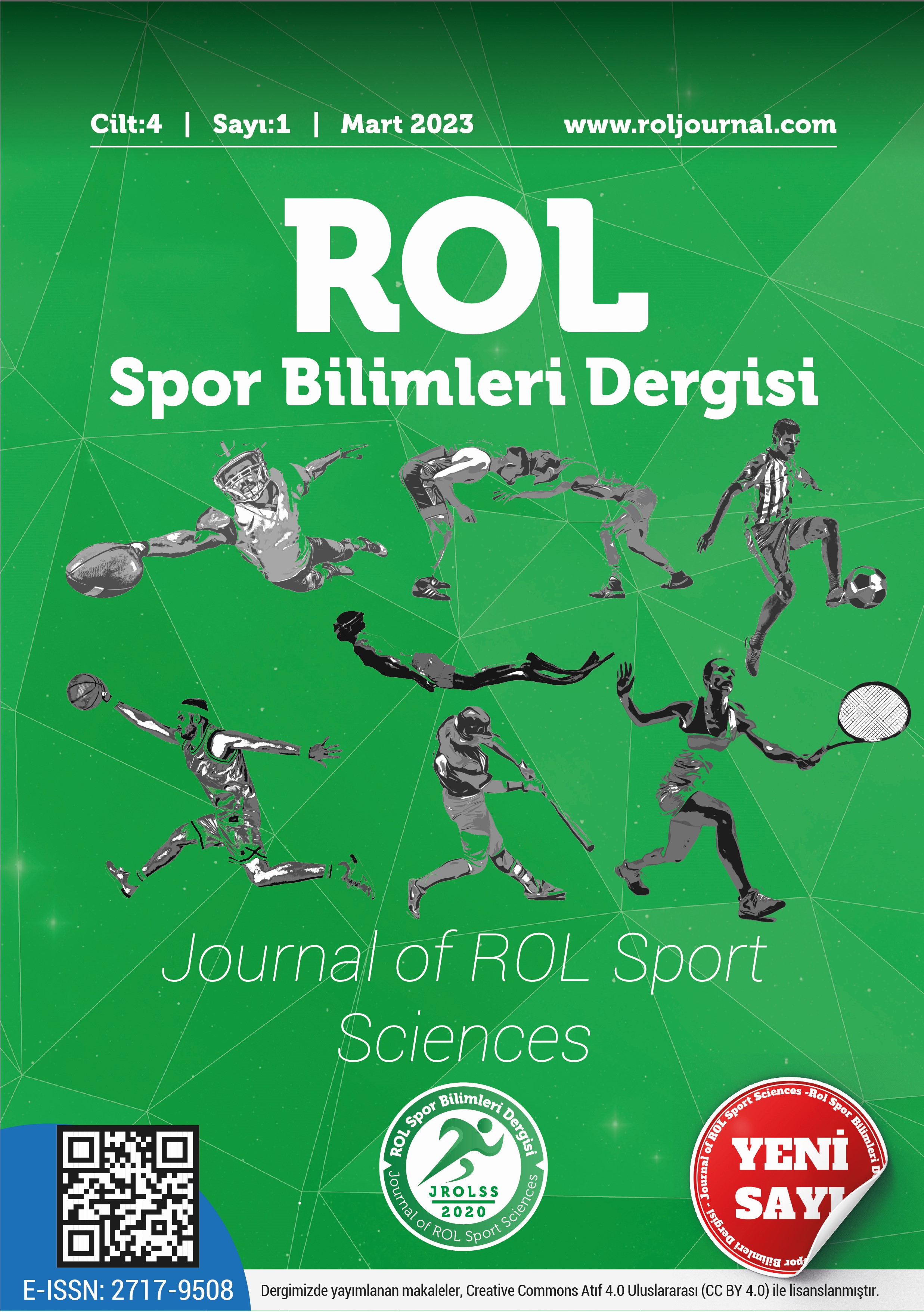The effect of professionalism on team athletes' tendency of violence
DOI:
https://doi.org/10.5281/zenodo.7740696Keywords:
Professionalism, team athletes, tendency of violenceAbstract
Today, professionalization is mandatory for sports, like all fields. However, it is claimed that ethical problems increase for professional sports that take place in different environments compared to recreational sports. For this reason, it becomes important to examine the possible effects of the professionalization of sports on the ethical values of sports and athletes. In this context, the aim of the research is to examine the effect of professionalism on the tendency to violence in team athletes. The data used in the research were obtained from 254 (100 female, 154 male) team athletes who formed the study group on a voluntary basis based on easily accessible sampling method. The data used in this descriptive study, which was conducted in the screening model, were obtained through the “Professionalism Scale for Athletes” and the “Scale of Violence in Team Sports”. According to the results obtained, it was determined that athlete professionalism and violence tendencies were negatively related, and athlete professionalism predicted emotional, physical, and verbal violence tendencies negatively. In line with this result, it can be commented that the increased perception of athlete professionalism and the tendency to emotional, physical, and verbal violence can be reduced.
References
Allison, L. (2012). Amateurism in sport: An analysis and defence. Routledge.
Aslan, M., & Uğraş, S. (2021). Tendency of violence in team sports athletes: A scale development study. SPORMETRE Beden Eğitimi ve Spor Bilimleri Dergisi, 19(2), 156-167.
Ayan, S. (2007). Aile içi şiddete uğrayan çocukların saldırganlık eğilimleri. Anadolu Psikiyatri Dergisi, 8(3), 206-214.
Boyt, T., Lusch, R.F., & Naylor, G. (2001). The role of professionalism in determining job satisfaction in professional services: A study of marketing researchers, Journal of Service Research, 3(4), 321-330.
Brown, E., Spiro, R., & Keenan, D. (1991). Wage and nonwage discrimination in professional basketball: Do fans affect it? American Journal of Economics and Sociology, 50(3), 333-345.
Burton, R. (2000). Violence in sport appalling – and appealing. Sports Business Journal, 3(30).
Chanavat, N. (2017). French football, foreign investors: global sports as country branding. Journal of Business Strategy, 38(6), 3-10.
Colburn, K. (1986). Deviance and legitimacy in ice-hockey: A microstructural theory of violence. The Sociological Quarterly, 27(1), 63-74.
Englund, T. (1996). Are professional teachers a good thing? İçinde I. S. Goodson & A. Hargreaves (Eds.), Teachers’ professional lives (s 75-87). Routledge Falmer
Güngör, N. B., Kurtipek, S. & İlhan, E. L. (2022). Sporcular için profesyonelizm ölçeği (spö)’nin psikometrik özelliklerinin incelenmesi. Spor Bilimleri Araştırmaları Dergisi, 7(1), 36-48.
Khareng, M., Machae, R., Awang, J., Ab Rahman, Z., & Mohd Noor, A.Y. (2020). Pencapaian profesionalism keguruan dalam kalangan guru agama alumni academy pengajian Islam dan Bahasa Arab, Princess of Naradhiwas University (Aias-Pnu). Akademika, 90(2), 127-138.
Ludwig, S. (2020). Professionalism. Pediatrics in Review, 41(5), 217-223.
Mujahidah, Afiah, N., & Syaiful. (2020). Perceptions of English education program students towards the profesionalism of English education lecturers in online learning at IAIN Parepare. Asian Social Science and Humanities Research Journal (ASHREJ), 2(2), 70-76.
Yarayan, Y.E., Yıldız, A.B., Gülşen, D.B.A., & İlhan, L. (2020). Futbolculuk seviyesi prososyal ve antisosyal davranışların bir belirleyicisi midir? SPORMETRE Beden Eğitimi ve Spor Bilimleri Dergisi, 18(4), 125-133.
Orwell, G. (1968). The collected essays, journalism, and letters of George Orwell: In front of your nose, 1945-1950 (Vol. 4). Harcourt, Brace & World.
Raney, A.A., & Bryant, J. (2009). Handbook of sports and media. Routledge.
Rosen, S., & Sanderson, A. (2001). Labour markets in professional sports. The Economic Journal, 111(469), 47-68.
Simpson, D. (2010). Being professional? Conceptualizing early years professionalism in England. European Early Childhood Education Research Journal, 18(1), 5-14.
Tabachnick, B.G., & Fidell, L.S. (2013). Using multivariate statistics: Pearson new international edition. Pearson Higher Education.
Tichenor, M.S., & Tichenor, J.M. (2005). Understanding teachers’ perspectives on professionalism. The Professioanl Educator, 27(1-2), 89-95.
Tufegdžija, M., & Šabić, E. (2018). The Problem of athletes violence in sports competitions and its prevention. Journal of Sports Science, 6, 60-64.
Türk Dil Kurumu (2023). Türk Dil Kurumu Sözlükleri. 01.29.2023, https://sozluk.gov.tr/
Weiss, O., & Norden, G. (2021). Introduction to the sociology of sport. Brill.
Whysall, P. (2014). Reflections on ethics, sport and the consequences of professionalisation. Business Ethics: A European Review, 23(4), 416-429.
Wilson, B., Stavros, C., & Westberg, K. (2008). Player transgressions and the management of the sport sponsor relationship. Public Relations Review, 34(2), 99-107.
Downloads
Published
How to Cite
Issue
Section
License
Copyright (c) 2023 ROL Spor Bilimleri Dergisi

This work is licensed under a Creative Commons Attribution 4.0 International License.

